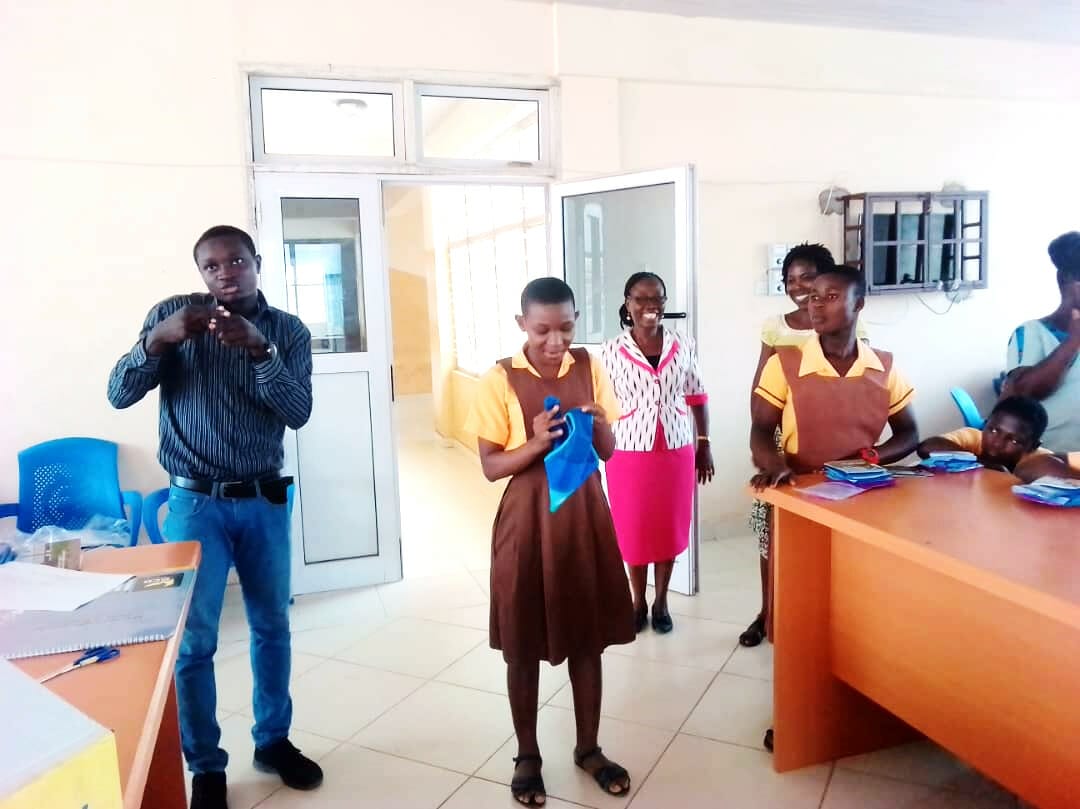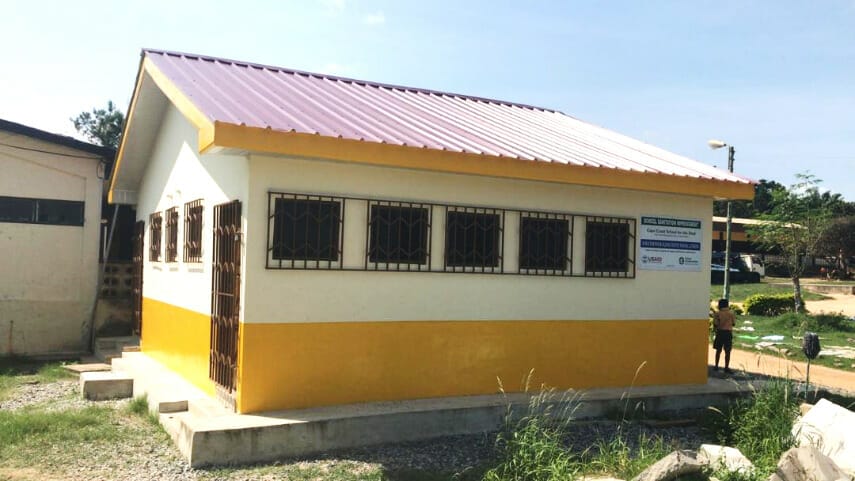News > Blog
Working to End Period Shame and Poverty in Parts of Africa
Published 05/28/2022 by Global Communities

Lack of education on menstrual hygiene and health, persisting taboos and stigma, limited access to menstrual products and poor sanitation facilities undermines the educational opportunities, health and overall social status of women and girls around the world. As a result, millions are kept from reaching their full potential.
In recognition of Menstrual Hygiene Day, learn how Global Communities is working with women and girls in Ghana and Botswana to help them manage their menstruation safely, hygienically and without shame.
An Holistic Approach to Menstrual Hygiene Management
Many girls have questions about their menstrual cycle, experience discomfort and have trouble accessing user-friendly menstrual health products, but girls who have visual or hearing impairments may face additional challenges.
In Ghana, through the U.S. Agency for International Development’s WASH for Health program, Global Communities partnered with 35 schools in six regions to deliver more inclusive and holistic menstrual hygiene management education and products. More than 100 girls at the Cape Coast School for the Deaf and Blind were among the nearly 5,000 students, parents and caregivers who benefited from this outreach over the last six years.
Global Communities, in partnership with the Ghana Education Service, organized one-day educational sessions for each participating school with sign language interpretation and other inclusive elements. Topics spanned from reproductive health to the management of menstrual cramps. Participants also learned how to ensure a proper diet during menstruation, including guidance on eating more iron-based foods.
Each girl received two pairs of leak-proof and stain-resistant Be Girl underwear with four reusable towel inserts and a SmartCycle menstrual tracker. Students took turns practicing how to use the mechanical disk, which helps girls monitor their periods by linking numbered days with key phases of the menstrual cycle. Prior to this intervention, most were unable to track their menstrual cycle or afford sanitary pads every month, leading to stained uniforms and/or school absences.
At participating co-ed schools, boys were also included in education sessions and received booklets on menstrual hygiene management to take home, encourage community support and reduce stigmatization.
Providing Schools with Period-friendly WASH Facilities
Aside from providing inclusive education, another key component of menstrual hygiene management is ensuring access to adequate water, sanitation and hygiene (WASH) facilities in schools.
Prior to the WASH for Health program, Cape Coast School for the Deaf and Blind only had a four-seat toilet facility to serve the entire school and a pit latrine that had been raided by reptiles and insects. The problem called for urgent attention, as over 15 percent of the school’s 531 students have visual impairments, and the infrastructure posed a sanitation and health threat to all students and staff.

Global Communities, in collaboration with the Caterpillar Foundation, supported the construction of an improved toilet facility with eight seats and a changing room for girls. In addition, trainings were organized for school authorities and school health education program members on facility maintenance and key hygiene behaviors, including handwashing and menstrual hygiene management.
Ayifua St. Mary’s Anglican School also had challenges regarding their WASH facilities. Prior to the WASH for Health program, students only had access to one toilet facility with eight seats. Only four of the toilets were fully functional and two were reserved for teachers. A partnership with the Caterpillar Foundation resulted in the construction of a new toilet facility with eight seats and a changing room.
Addressing ‘period poverty’ in BOtswana
Since 2016, Global Communities, in partnership with the U.S. Agency for International Development (USAID), has been implementing DREAMS in Botswana, a program aimed at reducing vulnerabilities of adolescent girls and young women to HIV infections and gender-based violence. Part of the curriculum, delivered by trained community mentors in safe spaces, includes education on menstrual hygiene management and breaking the silence around periods.
According to DREAMS participants, religious beliefs, cultural practices and social myths make it difficult for some children to talk to their parents or caregivers about menstruation. This gap in communication results in them not using proper products or receiving appropriate information about how to take care of themselves during their monthly cycle.
Socioeconomic factors also play a role in menstrual hygiene practices. DREAMS mentors and participants note that “period poverty” – or lack of access to education, clean water, separate latrine facilities and menstrual hygiene products – exacerbates challenges for adolescent girls and young women living in more rural areas of Botswana. They have given examples of girls using book covers, rags and other unsanitary materials to manage their menstruation.
To address this challenge, DREAMS helps stand in the gap by providing evidence-based and age-appropriate health information and menstrual products to the more than 1,980 girls participating in the program.
“We note with pride that boosting the confidence of adolescent girls and young women, teaching them about menstruation, letting them know that there is no shame in bleeding and that taking care of themselves during this time is as important as breathing is noble,” said Botlhale Sebataladi, Communications and Mobiization Officer for Global Communities Botswana.
Learn more about how Global Communities is working to advance gender equality and promote inclusive development around the world.





